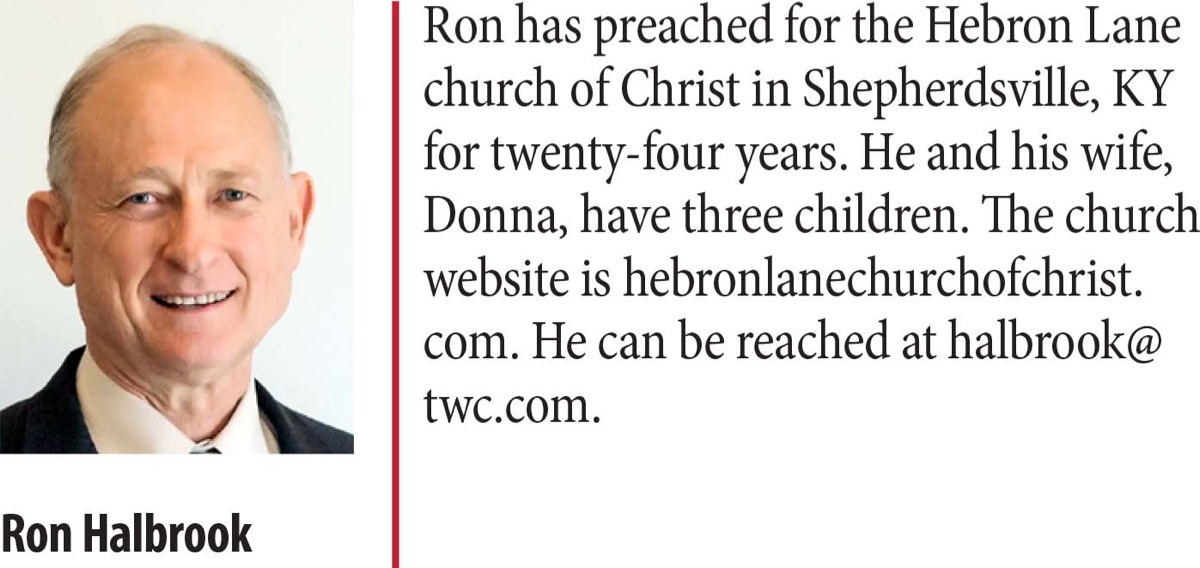
by Ron Halbrook
Synopsis: Christians are fellows with God and each other, and their fellowship relates to this spiritual relationship, not to shared meals, social interaction, and secular activities—which are the domain of the home, not the church.
The inspired apostle John expressed the fulness of the fellowship we have as Christians when he wrote, “That which we have seen and heard declare we unto you, that ye also may have fellowship with us: and truly our fellowship is with the Father, and with his Son Jesus Christ” (1 John 1:3). Does that fellowship include the church organizing, sponsoring, and overseeing social functions?
Fellowship involves sharing based on common ties or interests. Fellows have fellowship. In the New Testament, it refers to the common spiritual relationship shared by Christians with God and each other. Our union or partnership with God automatically makes us brothers and partners with each other. Fellowship is expressed in concrete ways by people who share this bond—it can be seen in action.
The sharing of faith, relationship, and actions by Christians is described in the New Testament, especially by a family of words rooted in the Greek noun koinos, meaning something shared in common. Related terms include the nouns koinōnia, for sharing in common or joint participation, and koinōnos, a person who shares or partakes in something, and the verb koinōneō, meaning to have fellowship, to become a partner or associate.
As humans, we relate to each other in many ways: the common bond of humanity, family ties, national identification, business associations, civic and political partnerships, educational endeavors, recreational functions, athletic contests, and social activities such as sharing meals. In other words, we share all sorts of things based on a wide range of mutual interests and bonds. In the broadest sense, fellowship or sharing can apply to this whole range of activities among all kinds of people, but the New Testament does not use it that way.
We have a deeper bond of unity, a spiritual fellowship, with God because we are made in His image and are reconciled to Him in Christ (Gen. 1:27; Col. 1:18-22). When the New Testament speaks of fellowship among Christians, it refers to this spiritual relationship with God and each other. The word is never applied to other commonalities we share, such as our humanity, our earthly families, or civic, recreational, and social functions, such as sharing meals.
1 John 1:3-7 highlights the deep spiritual relationship signified by the term, fellowship:
That which we have seen and heard declare we unto you, that ye also may have fellowship with us: and truly our fellowship is with the Father, and with His Son Jesus Christ. And these things write we unto you, that your joy may be full. This then is the message which we have heard of him, and declare unto you, that God is light, and in him is no darkness at all. If we say that we have fellowship with Him, and walk in darkness, we lie, and do not the truth: But if we walk in the light, as He is in the light, we have fellowship one with another, and the blood of Jesus Christ His Son cleanseth us from all sin.
Here, the noun koinonia is used four times in reference to the spiritual bond Christians have to God and to each other. John is not teaching that we share social meals, birthday parties, wedding showers, fishing trips, movies, basketball games, and similar secular activities with the Father and the Son, and then with each other. We share a right relationship with the Father and the Son because we are cleansed by the blood of Christ and walk in righteousness rather than sin. There is no hint in this passage of the church sponsoring social functions.
2 Peter 1:1-4 provides another beautiful picture of our unity in Christ. Peter addressed saints who “have obtained like precious faith with us,” have “all things that pertain unto life and godliness,” and have become “partakers (noun koinonos) of the divine nature, having escaped the corruption that is in the world through lust.” We partake in the righteous and holy nature of God when we escape a life of sin by being baptized into Christ (Rom. 6:1-7, 16-18). The gospel teaches us all things that pertain to this new life. There is no instruction here about sharing social meals, though such meals can be both healthy and pleasant.
When Jude wrote about “the common salvation,” he urged saints to “earnestly contend for the faith which was once delivered unto the saints” (v. 3). The salvation saints share in common (noun koinos) requires that we vigorously defend the teaching upon which it is based. To follow a different doctrine destroys that common salvation. There is nothing here about sharing in social functions. “Love feasts” in verses 12-13 are not church sponsored social meals; rather, Jude here warns against false teachers figuratively “feeding themselves” as in Ezekiel 34 by spreading error to promote themselves rather than feeding God’s people the truth.
The New Testament speaks of fellowship that Christians should and should not have in serving God. His promises regarding our final salvation will never fail us, and He called us “unto the fellowship of his Son Jesus Christ our Lord” (1 Cor. 1:9). This fellowship (noun koinonia) with Christ includes the truth He gave us, participation in His sufferings, and the salvation He provides, but we are not engaged in social functions with Him.
Sharing in the Lord’s Supper is a spiritual “communion” (noun koinonia) in the benefits of the body and the blood of Christ which was offered for our sin (1 Cor. 10:16). Likewise, the Jews were “partakers of the alter” (noun koinonos) when they ate a portion of the sacrifices they offered, i.e., their sins were forgiven in view of the promised Messiah. Saints must not participate in idol feasts lest they “be participants with demons” (NIV; noun koinonos). None of the activities pictured here pertains to social functions, but it is clear that the Lord’s Supper, rather than a social meal, is the Christian’s fellowship meal. Paul said, “And if any man hunger, let him eat at home; that ye come not together unto condemnation (1 Cor. 11:34).
Paul warned the church at Corinth not to receive false teachers: “what fellowship hath light with darkness? (2 Cor. 6:14) Brethren at Jerusalem signified their unity in faith and practice with Barnabas and Paul by extending”the right hands of fellowship” (Gal. 2:9). The noun koinonia in these passages refers to sharing in the truth, not in social activities.
The collection and its use are “fellowship” because they express our shared faith, relationship, and work in God’s kingdom. Acts 2:42 includes “the fellowship” (noun koinonia) disciples share in worship. In Greek, the article “the” precedes fellowship, indicating a specific act of worship when the saints contribute funds into the treasury. It was used especially for benevolence because the huge number of conversions resulted in many emergency needs. They “had all things common” (noun koinos), i.e., a common treasury, and even sold possessions when necessary to meet the pressing needs (Acts 2:44-45; cf. 4:32).
Many passages show that the treasury was used for benevolence to needy saints (2 Cor. 8:4, noun koinonia) and for evangelism (Phil. 4:15, verb koinoneo) but never for social activities as expressions of the church’s fellowship.
So-called “fellowship” halls/rooms provided by churches are unscriptural and are misnomers in terms of speaking as the Bible speaks (1 Pet. 4:11). The early church assembled to participate in their spiritual fellowship with God and each other in Acts 2:42 and 46 (“daily with one accord in the temple”). Individual saints made their own arrangements to share social meals “in their homes and ate together with glad and sincere hearts” (Acts 2:46, NIV).
When the line is crossed separating the church’s work from individual activities, the church soon loses its distinctive spiritual nature. It becomes all things to all men, as broad and wide as the human imagination can reach with all sorts of meals, parties, games, contests, social services, secular educational offerings, athletics, political activities, job and business training, medical and dental clinics, and the-sky-is-the-limit. The church reflecting “the manifold wisdom of God” in the New Testament is corrupted into a worldly institution created by man in the image of his own misconceptions about “religion” and “fellowship” (Eph. 3:10). 


